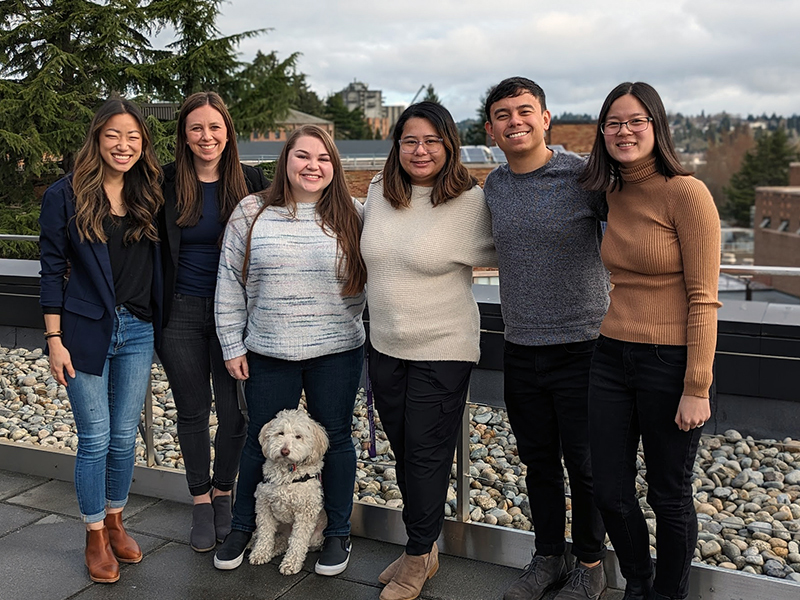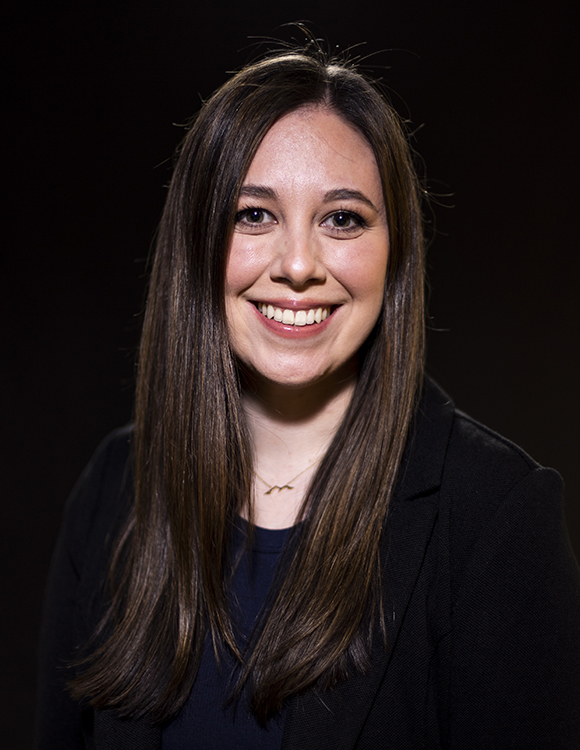Champion, advocate, role model…based on her colleagues’ descriptions, Chloe Dolese Mandeville sounds like a regular Girl Scout. Which, it so happens, she is: for the past two and a half years, the Allen School’s Assistant Director for Diversity & Access has volunteered as a troop leader for the Girl Scouts of Western Washington, hosting activities on campus and inspiring girls to see computing as a potential career path.
It is but one example of the many ways in which Dolese Mandeville has helped students to engage with the field — efforts that have now earned her a 2023 Distinguished Staff Award from the University of Washington. Part of the UW Awards of Excellence, the Distinguished Staff Award is the highest honor bestowed upon staff by the University.
As the saying goes, not all heroes wear capes.
“Chloe’s responsibilities are enormous — hers is definitely not a job for a mere mortal,” said professor Dan Grossman, Vice Director of the Allen School. “But she built a strong team to help her get it done, and she is a phenomenal leader. People love working with her.”
After graduating from UW with a bachelor’s in psychology with a minor in education, Dolese Mandeville joined the Allen School’s undergraduate advising team in 2016 to assist students in charting their own educational journeys. She took a particular interest in transfer students and the unique challenges they face in acclimating to the UW, teaching a seminar designed to help ease the transition. She simultaneously worked on a transition of her own as she pursued a master’s degree in leadership in higher education.
That degree would come in handy when, a mere two months after completing it, she took the reins of the school’s Diversity & Access program.
At the time, the Allen School’s undergraduate program had earned a national reputation for its success in recruiting and retaining women in computer science. But gender was the only area in which the school seemed to be making headway when it came to the breadth of students it serves. Not long before Dolese Mandeville assumed her present role, Jeff Dean (Ph.D., ‘96), Google Senior Fellow and Chief Scientist, and his wife Heidi Hopper approached school leaders with a challenge to extend the same energy and fervor they had devoted to growing the school’s gender diversity to other underrepresented groups.
Dolese Mandeville embraced that challenge — and ran with it. Among her first priorities was morphing the school’s K-12 outreach programs from “broad and shallow” to “narrow and deep” by building substantive, sustainable partnerships with a set of schools and community organizations that directly served student populations the school was trying — and to that point, largely failing — to reach. With this new approach, the school soon surpassed the Seattle campus-wide average in the proportion of students who are Black or African American, from economically disadvantaged backgrounds, or among the first in their families to pursue a four-year degree. Previously, the share of the school’s students who identified with these groups was half, or less, than that of the campus as a whole.
“We are serving an increasingly diverse undergraduate population that is more reflective of the face of Washington and of technology users around the world,” said professor Ed Lazowska, Bill & Melinda Gates Chair Emeritus in Computer Science & Engineering in the Allen School. “Chloe has been instrumental in this remarkable transformation. We wouldn’t have made this progress without her.”
The notion of transformation comes up repeatedly in conversations about Dolese Mandeville’s impact. It is among the many superlatives offered by members of the Allen School’s undergraduate student services team who work alongside her every day.
“Chloe’s compassion, skill, talent and hard work have truly had a transformational effect on the Allen School student experience,” said Crystal Eney, director of undergraduate student services. “Chloe’s tenacity and creativity are among her greatest strengths, and the Diversity & Access team has risen leaps and bounds from where it started under her leadership.”
Another word that is mentioned in connection with Dolese Mandeville is “fierce” — but her peers are quick to point out that such fierceness is accompanied by compassion and kindness. And, they note, her leadership is paying dividends not only for UW but also for the broader field of computing.
“Chloe’s impact on the Allen School and computing is vast and unparalleled. Her leadership in building equitable, justice-oriented programs and systems while centering the student experience is one of Chloe’s greatest strengths.” observed Leslie Ikeda, who manages the Allen School Scholars Program, “If anyone can transform the work we are doing to support our field’s most vulnerable populations, it’s Chloe.”

The program Ikeda manages, formerly known as Allen School Startup, was initially conceived as an immersive, four-week summer experience to assist incoming first-year students who are first-generation, low-income and/or from underserved communities in their transition to college. It has since evolved under Dolese Mandeville’s direction into a comprehensive, year-long cohort-based program with wraparound support. The summer bridge course remains, but that is now accompanied by increased staff support, one-to-one mentorship, workshops that supplement students’ first-year coursework, a new study hall course and community-building events throughout the year.
“Our mission is to educate the next generation of outstanding computer scientists and computer engineers who reflect the diverse needs, backgrounds and experiences of people in society at large,” said Juliet Quebatay, senior program manager for K-12 outreach programs. “Chloe supports us all with time, energy, constructive feedback and a clear vision of where we want to go — all while creating realistic, sustainable collaborations and programming that will help the school get there.”
“Us all” is the close-knit team of full-time professional staff that Dolese Mandeville has assembled to execute on that vision. In addition to Quebatay and Ikeda, the team includes Christina Huynh, academic adviser for the Allen Scholars; Kayla Shuster Sasaki, who focuses on high school and transfer student recruiting, and EJ Pinera, who works directly with Allen School student groups such as Ability, Women in Computing (WiC), GEN1, Minorities in Tech (MiT) and Q++ — to name only a few. Like much of the school’s current DEIA-focused initiatives, those groups got their start with Dolese Mandeville’s encouragement.
“Chloe championed the importance of student groups in building community and a sense of belonging for all students in the Allen School,” Pinera said.
Dolese Mandeville also championed a mentorship initiative alongside undergraduate students called Changemakers in Computing. CiC is a summer program for rising juniors and seniors in Washington state high schools interested in exploring technology and its intersection with society and justice. Through a combination of culturally relevant project-based learning and networking opportunities, the program empowers students from marginalized backgrounds to engage with computing as a potential career while building a community of future computer scientists and engineers who will be changemakers in the field. Importantly, CiC is completely free to participants; meals, public transportation to campus and all activities are covered by the program, as is an education stipend, to ensure that a lack of financial resources is no barrier to student participation.
The program has grown from serving roughly 20 high school students when it was launched in 2021 to 40 students in the most recent cohort. Encouraging students to lead the way, as she did with CiC — and backing them up with the tools and resources that will help them to succeed — is characteristic of Dolese Mandeville’s approach.
“Chloe prioritizes student voices,” said Chelsea Navarro, senior academic adviser. “She takes actions big and small to ensure that students of all backgrounds feel that they belong and can thrive here.”
Those actions include teaming up with Pinera, Assistant Director of Advising Jenifer Hiigli and Senior Academic Adviser Rakeb Million to push for the creation of physical spaces in the school’s buildings that reflect its values around DEIA. Spaces such as the Diversity & Access student lounge and a dedicated prayer/meditation room offer places where students can support each other, share experiences and honor their whole selves.
In addition to taking concrete steps that contribute to a more welcoming and inclusive culture, Dolese Mandeville is also committed to setting the school up for success over the long haul.
“Chloe is amazing and an incredible asset to the Allen School. Our entire community — students, staff and faculty — benefit from her presence,” said professor Tadayoshi Kohno, the Allen School’s associate director for diversity, equity, inclusion and access. “In summer 2020 Chloe and I started working on a 5-year strategic plan to guide our DEIA work, and her vision, leadership and wisdom have been instrumental in getting us to where we are today.”
“Where we are today” is a testament to how effective Dolese Mandeville has been in helping the Allen School rise to the challenge issued by Hopper and Dean since she stepped into her role.
“I see firsthand, every day, the amount of energy, compassion and thought Chloe puts into building out our DEIA efforts,” said Hiigli. “The Allen School would absolutely not be the same if she had not been here building these programs over the past several years.
“Chloe’s work has benefited thousands of computer science students in countless ways.”
Two of Dolese Mandeville’s Allen School colleagues were also among the nominees for 2023 Distinguished Staff Awards: Senior Academic Adviser Chelsea Navarro, in the individual impact category, and Robotics Lab Manager Selest Nashef, in the individual collaboration category.
Dolese Mandeville and her fellow honorees will be formally recognized at a campus ceremony on June 8.
Learn more about the UW Awards of Excellence here.


